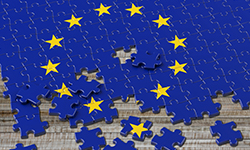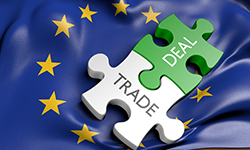BusinessEurope Headlines No. 2021-13
Discussing EU Slovenian Presidency priorities in social affairs

The EU Recovery and Resilience Facility offers a once-in-a-generation opportunity to transform our economies by boosting productivity, growth and competitiveness. Now is the time to make the next steps to pave the way to a solid recovery. A key point for employers in the short-term is that policy-makers at EU and national levels need to come forward with solutions that will markedly improve conditions for employers to hire people. To overcome common European social challenges, we need a trustful cooperation between the European Commission, EU Member States, and social partners. Together, we need to facilitate job-creating investment and reform our labour markets and social systems to ensure future prosperity. BusinessEurope looks forward to working together with the Slovenian Presidency of the Council of the EU in the run up to and during the second half of 2021. These were the key messages passed by BusinessEurope Director General Markus J. Beyrer to the Slovenian Labour Minister Janez Cigler Kralj in a meeting on 20 April.
Contact: Maxime Cerutti
Our comment
Trade: a powerful tool to diffuse conflicts
By Luisa Santos, Deputy Director General
 We tend to look primarily at the economic benefits of trade. Increasing trade flows brings more and better business opportunities for companies and this will eventually lead to more investments and more jobs. The EU free trade agreements provide some good examples:
We tend to look primarily at the economic benefits of trade. Increasing trade flows brings more and better business opportunities for companies and this will eventually lead to more investments and more jobs. The EU free trade agreements provide some good examples:
- Trade in goods between the EU and Canada increased by 25% as compared to pre-CETA times until the start of the COVID-19 pandemic and even after the pandemic we had still a 15% increase.
- EU exports to Japan experienced an increase after the entry into force of the EU-Japan Economic Partnership Agreement (EPA),[1] namely in those sectors with higher tariff reductions, 10,4% increase in dairy exports, 9,5% increase in apparel exports or 16,4% in electrical machinery exports.
The benefits of trade are also tangible at the multilateral level with the World Trade Organisation (WTO) playing a central role. The Trade Facilitation Agreement that entered into force on 22 February 2017 is a good example. The agreement aims to expedite the movement, release and clearance of goods, and defines measures to promote cooperation in customs compliance. Once fully implemented, the agreement is expected to reduce costs by 14,3% on average and boost global trade by up to $US 1 trillion per year[2] with the larger benefits for least developing countries. For instance, in the case of Africa the cost reduction on average would be 16,5% and in some countries could be as high as 23%.
But hidden behind the numbers there is an even more important benefit of trade. Trade helps to diffuse conflicts by promoting global cooperation and people-to-people exchanges. By generating economic growth and further integration of countries and regions in the world economy, trade also contributes to stability and peace. For instance, Iran was willing to comply with the Joint Plan of Action (JCPOA) because some of its major trading partners including the EU and the USA were ready to lift the economic sanctions. The moment the USA decided to leave the JCPOA and it became more difficult also for European companies to trade with Iran, there were less incentives for the country to comply.
The opposite is also true. Increasing trade tensions can lead to more conflictual relations between countries. The best example is what is happening between the USA and China. Initially it started as a trade dispute, but tensions are now spreading fast to other areas that could potentially be more damaging from a geo-political and military point of view.
Trade is a powerful tool that can be used for positive change and to help mitigate the risk of conflicts, but if badly handled it can also increase tensions and conflicts.
Unfortunately, these days we see many actions aimed at withdrawing trade preferences or introducing trade restrictions. Unilateralism, self-interest and short-term gains seem to be on the rise as compared to multilateralism and global cooperation. Many are quick in pulling the trigger, but few are thinking about the consequences.
The business community should not stay silent. We must bring to the forefront of the debate that beyond the economic benefits for companies and workers, trade is key for peace, stability and global cooperation. Disengagement or decoupling are not the right answers in face of global challenges. This is even more important these days as a more rapid, equal and sustainable economic recovery from the COVID-19 will depend on international cooperation, keeping markets open and increasing global trade.
Contact: Luisa Santos
European and Canadian business letter on CETA implementation
 On 20 April, BusinessEurope addressed a letter to the Executive Vice President of the European Commission Valdis Dombrovskis regarding core outstanding issues in the implementation of the EU-Canada Comprehensive Economic and Trade Agreement (CETA). The letter was sent on behalf of BusinessEurope, the European Services Forum, EUROCHAMBRES, the Canada Europe Roundtable for Business, the Canadian Chamber of Commerce, the Business Council of Canada, Canadian Manufacturers and Exporters and the Canadian Agri-Food Trade Alliance as a follow up after the CETA Joint Committee meeting that took place on 25 March. To achieve its full potential, CETA needs to live up to its billing as a “living agreement” and show progress in fully implementing the conformity assessment protocol and enhancing regulatory cooperation in industrial sectors; ensuring market access for agricultural and food products by reducing non-tariff barriers; protecting geographical indications, as well as market access for wines and spirits; having transparency on temporary entry provisions and finalising the Mutual Recognition Agreement on qualification of architects.
On 20 April, BusinessEurope addressed a letter to the Executive Vice President of the European Commission Valdis Dombrovskis regarding core outstanding issues in the implementation of the EU-Canada Comprehensive Economic and Trade Agreement (CETA). The letter was sent on behalf of BusinessEurope, the European Services Forum, EUROCHAMBRES, the Canada Europe Roundtable for Business, the Canadian Chamber of Commerce, the Business Council of Canada, Canadian Manufacturers and Exporters and the Canadian Agri-Food Trade Alliance as a follow up after the CETA Joint Committee meeting that took place on 25 March. To achieve its full potential, CETA needs to live up to its billing as a “living agreement” and show progress in fully implementing the conformity assessment protocol and enhancing regulatory cooperation in industrial sectors; ensuring market access for agricultural and food products by reducing non-tariff barriers; protecting geographical indications, as well as market access for wines and spirits; having transparency on temporary entry provisions and finalising the Mutual Recognition Agreement on qualification of architects.
![]() Contact: Eleonora Catella
Contact: Eleonora Catella
Real effort on removal of Single Market barriers yet to be seen
 It has been more than a year since the European Commission published its Single Market governance package on 10 March 2020: the Long term action plan for better implementation and enforcement of single market rules , accompanied by the communication “Identifying and addressing barriers to the Single Market”. To monitor the implementation of this Action Plan, analyse compliance of national laws with the Single Market rules and address the barriers through better cooperation and enforcement, a Single Market Enforcement Taskforce (SMET) was set up.
It has been more than a year since the European Commission published its Single Market governance package on 10 March 2020: the Long term action plan for better implementation and enforcement of single market rules , accompanied by the communication “Identifying and addressing barriers to the Single Market”. To monitor the implementation of this Action Plan, analyse compliance of national laws with the Single Market rules and address the barriers through better cooperation and enforcement, a Single Market Enforcement Taskforce (SMET) was set up.
As the COVID-19 pandemic hit the EU, lots of the planned work was understandably postponed. The European Commission also made great efforts to protect the integrity of the Single Market under the pressures of this crisis. The SMET seems to have also been mandated to address the Single Market disruptions caused by the COVID-19 -related restrictions of EU Member States, in order to keep the Single Market rules and supply of goods and services to Europeans intact.
Still, this crucial role of the SMET remains somewhere in the “outer space”, as there is hardly any information available on its activities and results. In response to the above-mentioned Action Plan that established the SMET, in 2020 BusinessEurope asked the European Commission to ensure transparency of SMET activities and an open dialogue with stakeholders. Supporting the SMET as an additional catalyst for good implementation and enforcement of rules in the Single Market, BusinessEurope suggested that the SMET could also assist the Commission in identifying the most pressing barriers if the criteria were clearly defined and transparent in this regard. This could enable the Commission to indicate which initiatives in its annual work programmes tackle the prioritised barriers.
Today many of these questions remain open and BusinessEurope expects them to be addressed urgently, as we spell out in our latest letter to Commissioner Breton of 16 April.
![]() Contact: Martynas Barysas
Contact: Martynas Barysas
Adapting our social security systems and labour markets to demographic ageing
 Demographic ageing and the related shrinking of the EU working age population is challenging Europe’s growth potential. In this context, ensuring the financial viability and sustainability of social security systems is a key concern. The EU should improve statistical data on the cost dynamics of national social security systems to lay the ground for sustainable social protection. This should be combined with efforts to reduce the tax wedge on labour to encourage employers to hire, and the need to improve the role of in-work benefits to encourage more people to work. Moreover, in the demographic context we are in, the EU and Member States have no choice but to markedly reduce inactivity levels in our societies. Inactivity often comes at a high price for many of the individuals concerned. It is a price our societies cannot afford in the long-term. A key part of the solution is to strengthen employment participation of women. Good quality and affordable childcare and long-term care provisions are also crucial to enable professional activity for parents and workers with dependent family members. Finally, older workers should be encouraged to stay professionally active through pension-related incentives, flexible work organisation and phased-out retirement. These were the key messages conveyed by Maxime Cerutti, BusinessEurope's Social Affairs Director, during the European Commission’s dedicated hearing with social partners on the Green Paper on ageing that was held on 16 April.
Demographic ageing and the related shrinking of the EU working age population is challenging Europe’s growth potential. In this context, ensuring the financial viability and sustainability of social security systems is a key concern. The EU should improve statistical data on the cost dynamics of national social security systems to lay the ground for sustainable social protection. This should be combined with efforts to reduce the tax wedge on labour to encourage employers to hire, and the need to improve the role of in-work benefits to encourage more people to work. Moreover, in the demographic context we are in, the EU and Member States have no choice but to markedly reduce inactivity levels in our societies. Inactivity often comes at a high price for many of the individuals concerned. It is a price our societies cannot afford in the long-term. A key part of the solution is to strengthen employment participation of women. Good quality and affordable childcare and long-term care provisions are also crucial to enable professional activity for parents and workers with dependent family members. Finally, older workers should be encouraged to stay professionally active through pension-related incentives, flexible work organisation and phased-out retirement. These were the key messages conveyed by Maxime Cerutti, BusinessEurope's Social Affairs Director, during the European Commission’s dedicated hearing with social partners on the Green Paper on ageing that was held on 16 April.
![]() Contact: Anna Kwiatkiewicz-Mory
Contact: Anna Kwiatkiewicz-Mory
Image copyright: European Commission
European and Andean domestic advisory groups need to step up cooperation
 “While lots of challenges remain, many key social indicators have improved in the Andean region in the past decade. The EU trade agreement with Colombia, Ecuador and Peru, combined with EU development cooperation with the region, has played a positive role in this regard”, said Benedikt Wiedenhofer, Adviser in the International Relations Department of BusinessEurope, at the meeting of the EU-Latin America Follow-up Committee of the European Economic and Social Committee (EESC). Wiedenhofer participated in the meeting in his capacity as chair of the EU Domestic Advisory Group (DAG) under the trade agreement with Colombia, Ecuador, and Peru to brief EESC members on the work of the DAG. “We now need to step up our cooperation with the DAGs in our Andean partner countries to jointly identify ways to leverage the trade agreement as a means to overcome the economic and social impact of the COVID-19 pandemic”, he added.
“While lots of challenges remain, many key social indicators have improved in the Andean region in the past decade. The EU trade agreement with Colombia, Ecuador and Peru, combined with EU development cooperation with the region, has played a positive role in this regard”, said Benedikt Wiedenhofer, Adviser in the International Relations Department of BusinessEurope, at the meeting of the EU-Latin America Follow-up Committee of the European Economic and Social Committee (EESC). Wiedenhofer participated in the meeting in his capacity as chair of the EU Domestic Advisory Group (DAG) under the trade agreement with Colombia, Ecuador, and Peru to brief EESC members on the work of the DAG. “We now need to step up our cooperation with the DAGs in our Andean partner countries to jointly identify ways to leverage the trade agreement as a means to overcome the economic and social impact of the COVID-19 pandemic”, he added.
![]() Contact: Benedikt Wiedenhofer
Contact: Benedikt Wiedenhofer
Calendar 
- 23 April: High-level EU-Africa green investment forum
- 28-29 April: Fueling productivity and business dynamism after COVID-19
- 30 April: Event on the EU-Mercosur Agreement - EU and Brazilian Business Committed to Sustainability
- 8 May: EU-India Business Round Table
Not yet a subscriber? Register here.
Reminder: please have a look at our privacy policy